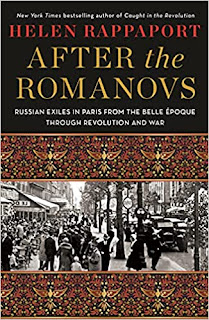"After the Romanovs" opens in a relatively light fashion as wealthy Russians, among them Romanovs, enjoy vacations and visits to France. Paris is a playground for them. Artists of all kinds flock there to rub shoulders with the elite of the world. Stars like Nijinsky shine. Intellectuals sought both rest and creativity, some even rubbing shoulders with a Russian visitor named Lenin. Yes, that Lenin. Needless to say, the tone of the book switches gears quickly after the Russian Revolution and assassination of the Tsar and his family. The Romanovs were now targets for the new regime. Many of those who once sought amusement or simply enjoyed the thriving creativity to be found in Paris found themselves fleeing to Paris once again, this time as refugees. Now largely penniless and unable to find work, this is their story. Even the mysterious Anastasia makes an appearance in the book. Watching this history unfold was at once both saddening and fascinating. The emotions of those in exile swung wildly from optimistic and hopeful for a return to Russia to lost and simply desperate to survive. Few had any practical skills and they were cut off from the past fortunes. The manner in which the French accepted them, of course, also varied. The Jazz Age occurred post revolution but the emigres, many of whom had never worked a day in their lives, were usually too busy trying just to stay alive with a roof over their heads and something to eat and wear, to be caught up in it. Interestingly enough, it was some of the female emigres who perhaps came closest, particularly those who found employment with Chanel or in the garment industry. Former duchesses found themselves doing piecework and embroidering to support their families. You might find yourself being seated at a ritzy restaurant by a former duke or driven about town by a taxi driver with royal connections. Rappaport writes at one point that the unifying thread between them all seemed to be a "solidarity in poverty". Starvation and suicide were common. Even though I found it a bit difficult to keep the names straight in my head -- I found myself scrolling back-and-forth frequently -- I found the book fascinating. The author has done extensive research and the amount of information she shares is almost staggering. You'll also see the birth of the current communist society which, even then, especially after Stalin's ascent, used spies and kidnapping to its benefit both against its own countrymen and the Russian emigres. There's much to take in here and kudos to author Rappaport for sharing her research with us in such a readable fashion. Thanks to #NetGalley and #StMartinsPress for the ARC. Even as a former history major and teacher, I came away with not just a more thorough knowledge of the post Russian Revolution emigres but history in general.
Subscribe to:
Post Comments (Atom)
Deadly Patterns, by Melissa Bourbonlow
Published 2012 Even with already crammed bookshelves, I can't resist the local library's monthly used book sale.Picked this up awh...

-
Publication March 14, 2023 When I last dropped in on Marla and husband Dalton, change was coming. This book, the 18th in the series, picks ...
-
I've read several of the books in this series and enjoyed them. Marla's change in circumstances from earlier stories, now a mother, ...
-
Publication Feb. 27, 2024 I should tell you up front that I came to this book with far more info than the average reader. True, it's p...





No comments:
Post a Comment